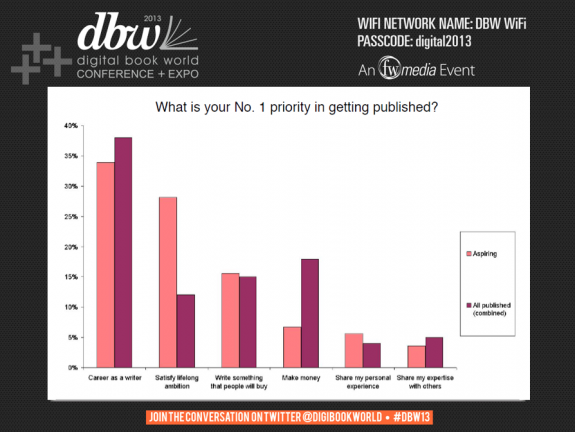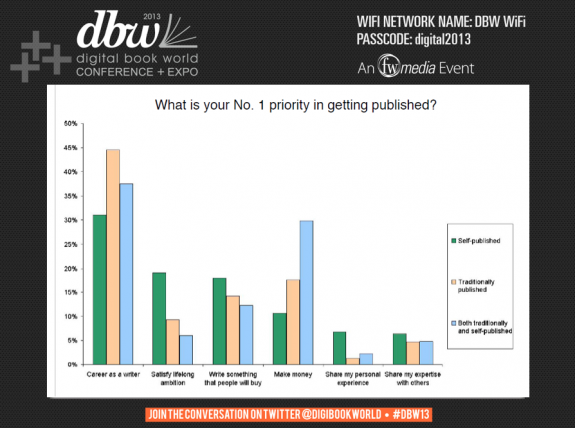We’re writers. We write because we love it, not for the money. It’s a noble sentiment but deep down I think many of us harbor the same secret dream: we want to make money writing. There’s just one little problem: most writers don’t like to think (or talk) about money. And if we won’t talk about the subject then we won’t get the information we need to make smart decisions.
The subject of money is almost taboo in our industry but it’s a crucial topic–one that affects our survival as writers and our industry’s survival as well. By tip-toeing around the topic, we’re doing ourselves a disservice. Like it or not, we have to think–and talk–about the money. It might not be a genteel or polite topic. Things might even get a little controversial or uncomfortable. And I’ll be honest with you, at first I didn’t want to go near this subject with a ten-foot pole.
But somebody has to do it, so it might as well be me.
The way I see it, there are two sides to this money issue: the emotional and the pragmatic. The former digs into how we as writers feel about money. What is that relationship like? Why do some writers struggle to get compensation for their work while others seem to have no trouble? And why is it so hard for writers to say those three simple words: “buy my book”?
These emotion-based questions are best handled by therapists and life coaches, and not being either I’m going to focus on the pragmatic side of the equation. The purpose of this article is to figure out a few crucial things. What do we know about writers and money? What are their expectations and how do they interact with money? And most importantly, how can the answers to these questions inform own career decisions?
Where does money fall among writers’ priorities?
Last week I talked a little bit about a survey conducted by Digital Book World. In that recap of the survey, I focused mostly on publishing decisions writers make, but there was another side to the survey results that I think are even more interesting. This has to do with the attitudes that authors have about money. As it turns out, traditionally published, self-published, hybrid* and aspiring authors differ dramatically when it comes to money.
Let’s dig into the data, shall we?
In terms of publishing priorities, aspiring authors seem very focused on building a writing career and fulfilling a life-long ambition . They don’t put nearly as much emphasis making money. In fact, only about 7% of aspiring authors say that making money writing is their their top priority in getting published. Published writers, on the other hand, seem to place money much higher among their priorities, second only to building their writing career. You can see this trend illustrated in the graph below.
If we tease the three categories of published authors, though, we see an even more interesting picture. Authors who only self-publish show a similar pattern to aspiring authors, with money being only the 4th most important factor they consider when publishing. Traditionally published and hybrid authors, on the other hand, both place emphasis first on their careers and second on making money.
But hybrid authors and traditionally published authors have a critical difference between them. For hybrid authors, money is a close second to career whereas the disparity between money and career is fairly significant for traditionally published authors. In fact, the size of that disparity is about the same as what we see with self-published authors.
Check out the graph below to see what I mean. The difference between the green bars and the tan bars in the career and make money columns is pretty stark. The gap in height between the blue bars for those same columns is much smaller. In statistics, they call this type of trend an interaction because the numbers are behave differently for the various categories of people.
What does all this statistical mumbo jumbo mean exactly? I can’t say for sure because while I’ve had the opportunity to review these graphs, I didn’t get to muck around with the actual numbers and do a detailed analysis. But what I can do is extrapolate a story and make inferences about what these data seen to be telling us.
The “reality check” moment of getting published.
There seems to be a stark contrast between the outlooks that writers have about money before and after they get published, particularly if it is via a traditional publisher. It’s almost as if there’s a “reality check” moment writers have when they get published. This realization suddenly kicks in that writing is a business and in order for this business to be viable it has to make money. But if writers wait until they’re published to have this epiphany, then for many of them it might already be too late.
Also, this “reality check” only seems to happen when an author publishes with a traditional publisher because if we look at the authors who only self-publish, their priorities are similar to that of aspiring authors. It seems almost as if authors only start putting money as a priority after they’ve been paid for their work by a traditional publisher. Are these writers not confident in their work? Does that work only have merit if it is vetted by a traditional publisher?
This is the very stigma that writers have been fighting to change for decades. And the irony is, the only way to kill this money-stigma is if we start dealing with the money issue head-on.
As writers, we need to value our work.
As writers we all deserve to be paid for our work, but often we undervalue the fruits of our labor. Sometimes it takes being vetted by an external entity (like a publisher) for us to realize that our work is valuable and deserves being paid. I’m not saying that all writers should be mercenary, calculating the currency of every word, but we need to be confident that we offer a valuable service to the world. Our words are not an unlimited resource and they should be treated with the same respect as the sparkly widgets of other industries.
It turns out that confidence in our work and savvy about the financials puts writers at an advantage. The Digital Book World study clearly shows that hybrid authors (i.e. both self and traditionally published) value their work product more than do any of the other categories of authors. For instance, these hybrid authors expect higher advances and royalties from publishers, and in turn, they make the most money of all the authors polled.
To give you an idea: the average annual writing income for a hybrid author is 50% higher than traditionally published authors and five times that of self-published authors. We’re not talking pennies, but a significant chunk of change. The message here is that while we might not go into writing for the money we writers have to recognize that publishing is a business. For better or worse, money is a critical component.
So, what’s the answer?
Don’t we all wish there was a magic solution? The truth is, making money writing is difficult road for writers to tread, especially now that our culture is now so saturated with free information on the web. Readers have come to expect everything for free which puts us writers in a tough spot. When books sell for $0.99 and writers pour their hearts and words into free blogs, websites and social media, it’s hard to change the rules of the game.
And the answer isn’t to stop creating free content either. Providing some pieces of our work for free is crucial for attracting new readers and connecting with audiences that might not consider our work otherwise. The secret is finding that balance between which elements of our work we can give away and which pieces merit a price tag. Signing with a traditional publisher makes that decision easy because the publisher decides for us. But for writers who choose a more entrepreneurial route, it’s critical that we don that business cap and make strategic decisions about the money.
Join the conversation!
This is a juicy topic and I’d love to hear your take. Change doesn’t happen overnight but open discussion is a great first step. Please leave a comment and share your thoughts about writing and money. In particular, I’d like to know:
Why do you think it’s so hard to make money writing?









